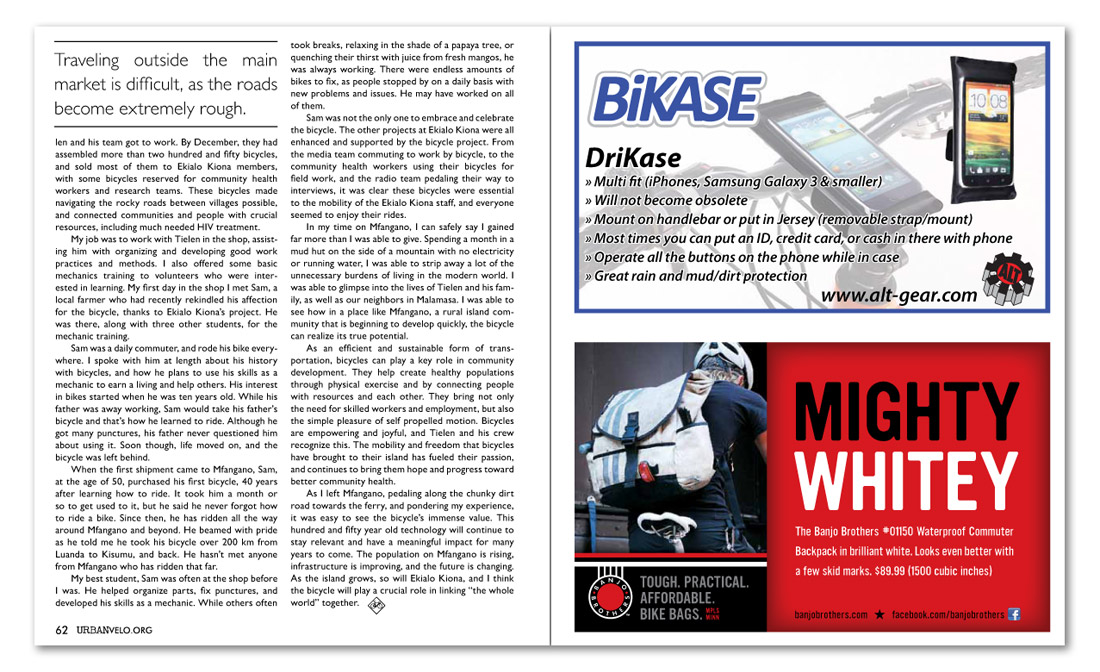


len and his team got to work. By December, they had assembled more than two hundred and fifty bicycles, and sold most of them to Ekialo Kiona members, with some bicycles reserved for community health workers and research teams. These bicycles made navigating the rocky roads between villages possible, and connected communities and people with crucial resources, including much needed HIV treatment.
My job was to work with Tielen in the shop, assisting him with organizing and developing good work practices and methods. I also offered some basic mechanics training to volunteers who were interested in learning. My first day in the shop I met Sam, a local farmer who had recently rekindled his affection for the bicycle, thanks to Ekialo Kiona’s project. He was there, along with three other students, for the mechanic training.
Sam was a daily commuter, and rode his bike everywhere. I spoke with him at length about his history with bicycles, and how he plans to use his skills as a mechanic to earn a living and help others. His interest in bikes started when he was ten years old. While his father was away working, Sam would take his father’s bicycle and that’s how he learned to ride. Although he got many punctures, his father never questioned him about using it. Soon though, life moved on, and the bicycle was left behind.
When the first shipment came to Mfangano, Sam, at the age of 50, purchased his first bicycle, 40 years after learning how to ride. It took him a month or so to get used to it, but he said he never forgot how to ride a bike. Since then, he has ridden all the way around Mfangano and beyond. He beamed with pride as he told me he took his bicycle over 200 km from Luanda to Kisumu, and back. He hasn’t met anyone from Mfangano who has ridden that far.
My best student, Sam was often at the shop before I was. He helped organize parts, fix punctures, and developed his skills as a mechanic. While others often took breaks, relaxing in the shade of a papaya tree, or quenching their thirst with juice from fresh mangos, he was always working. There were endless amounts of bikes to fix, as people stopped by on a daily basis with new problems and issues. He may have worked on all of them.
Sam was not the only one to embrace and celebrate the bicycle. The other projects at Ekialo Kiona were all enhanced and supported by the bicycle project. From the media team commuting to work by bicycle, to the community health workers using their bicycles for field work, and the radio team pedaling their way to interviews, it was clear these bicycles were essential to the mobility of the Ekialo Kiona staff, and everyone seemed to enjoy their rides.
In my time on Mfangano, I can safely say I gained far more than I was able to give. Spending a month in a mud hut on the side of a mountain with no electricity or running water, I was able to strip away a lot of the unnecessary burdens of living in the modern world. I was able to glimpse into the lives of Tielen and his family, as well as our neighbors in Malamasa. I was able to see how in a place like Mfangano, a rural island community that is beginning to develop quickly, the bicycle can realize its true potential.
As an efficient and sustainable form of transportation, bicycles can play a key role in community development. They help create healthy populations through physical exercise and by connecting people with resources and each other. They bring not only the need for skilled workers and employment, but also the simple pleasure of self propelled motion. Bicycles are empowering and joyful, and Tielen and his crew recognize this. The mobility and freedom that bicycles have brought to their island has fueled their passion, and continues to bring them hope and progress toward better community health.
As I left Mfangano, pedaling along the chunky dirt road towards the ferry, and pondering my experience, it was easy to see the bicycle’s immense value. This hundred and fifty year old technology will continue to stay relevant and have a meaningful impact for many years to come. The population on Mfangano is rising, infrastructure is improving, and the future is changing. As the island grows, so will Ekialo Kiona, and I think the bicycle will play a crucial role in linking “the whole world” together.
Banjo Brothers
BiKase